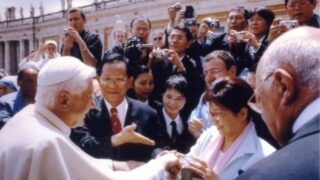Once again, as it did in several previous sessions, the UN ECOSOC-accredited NGO CAP-LC brought the case to the attention of the United Nations
by Thierry Valle
| United Nations | A/HRC/53/NGO/«AssignedNumber» | ||
| General Assembly | Distr.: General May 2023 English only | ||
Human Rights Council
Fifty-third session
19 June–14 July 2023
Agenda item 3
Promotion and protection of all human rights, civil,
political, economic, social and cultural rights,
including the right to development
Written statement* submitted by Coordination des Associations et des Particuliers pour la Liberté de Conscience, a non-governmental organization in special consultative status
The Secretary-General has received the following written statement which is circulated in accordance with Economic and Social Council resolution 1996/31.
[29 May 2023]
The Need for Granting Justice to Religious Groups Unjustly Persecuted in the Past: Lessons from Recent Events
CAP-LC is an NGO defending religious liberty. We often have to report bad news, and denounce the repression of religious minorities, particularly those stigmatized as “cults.” However, there are also positive developments, and it is part of our mandate to note them as well.
We have learned that democracy is no guarantee against violations of freedom of religion or belief. However, when more democracy is introduced, it often happens that more religious liberty is also guaranteed. We have noticed, in particular, the progress of religious liberty in countries once part of the Soviet Union. Although some problems occasionally surface, the Baltic States are a virtuous example of transition to religious liberty, and even in Central Asia, where freedom of religion or belief is not yet fully recognized, at least several Jehovah’s Witnesses and other prisoners of conscience have been liberated from jail.
These progresses are encouraging. Yet, a problem remains, which is part of transitional justice. When a country transitions to democracy, slowly or rapidly, how can human rights abuses of the past, including denial of religious liberty, be rectified?
This problem has been discussed recently in several conferences and events, including the yearly conference on freedom of religion or belief organized by the Evangelical Theological Institute (ETF) in Leuven, Belgium, on May 4 and 5, 2023.
Another important event has been the visit to Taiwan of a delegation of academics specialized in religious liberty issues and human rights activists, including two from CAP-LC, and a forum at the National Taiwan University in Taipei on April 9, 2023, on “Freedom of Religion or Belief: A Global Issue.”
This “international forum on peace and human rights” has discussed freedom of religion issues in several countries, from Romania to Japan, but one important focus has been transitional justice. A case study presented has been the one of Tai Ji Men, a menpai (similar to a school) of Qigong, martial arts, and self-cultivation. While the Martial Law period ended in Taiwan in 1987, a long post-authoritarian period followed. In 1996, a politically motivated crackdown hit several religious and spiritual movements, including Tai Ji Men. Its leader (Shifu), his wife and two dizi (disciples) were arrested. Although they were eventually found innocent of all charges, including tax evasion, in first and second degree and by the Supreme Court, the 1996 crackdown is the origin of a derivative tax case that resulted in ill-founded tax bills, and is not solved to this day. While the local tax authorities accepted to reduce to zero most of these fabricated tax bills, they maintained the one for the year 1992, based on a technicality. Because of this unpaid, and unfounded, bill, in 2020 land regarded as sacred by Tai Ji Men and intended for a self-cultivation center was seized, unsuccessfully auctioned off, and confiscated, generating massive street protests that continue to this day.
Clearly, what happened in 1996 is the root of what happened later. Currently, the “authoritarian period” to which transitional justice apply is regarded as including the years from August 15, 1945, when the Japanese colonial rule terminated, and ending on November 6, 1992, the day before the lifting of martial law in the Kinmen, Matsu, Dongsha, and Nanshi areas. It is believed that only during this period can the concept of transitional justice be applied to unjust actions carried out under the guise of public power. However, the religious crackdown of 1996 demonstrates that 1996 was still a “post-authoritarian year,” and transitional justice should also apply. Transitional justice has three pillars: rectifying the past human rights violations, punish the perpetrators, and take measures to avoid that the same problems may occur again in the future. It also has a fourth pillar, telling the truth to the population and candidly acknowledging past mistakes.
All this should be granted to Tai Ji Men, in a typical context where steps towards a full recognition of freedom of religion and beliefs have been taken, yet without transitional justice and the rectification of past wrongdoings the process will never be completed.
The scholars and activists who participated in the visit of April 2023 brought this message, which refers, first, to the specific case of Tai Ji Men, which urgently needs a solution, but also refers to all instances throughout the world where progress towards democracy and freedom of religion or belief should be accompanied by a sincere acknowledgement and rectification of the mistakes of the past.
CAP-LC fully endorses this message, and asks that transitional justice be implemented wherever needed, including in cases where the main human right violated was freedom of religion or belief.
Image: Registration of the written statement by CAP-LC at the United Nations Human Rights Council.
* Issued as received, in the language of submission only.












